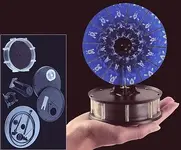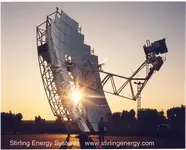Metal Head said:
Your car engine makes more energy than it needs. That is why you can run a stereo, lights ..etc. Your hydrogen generator uses the power that is already available. And I agree it does work to improve gas mileage but lets not confuse that with zero point energy.
It is a scientific fact that you can not get more energy out of something than you put in, there is always loss. If you could, all of our energy problems would be solved.
Metal Head said:
The problem with hydrogen is it takes more energy to make it than it produces.
Energy can neither be created or destroyed. It can only be converted from one form to another. 5th grade science.
Let's see . . . you said my car engine makes more energy than it needs . . . but you say you can't get more energy out of something than what you put in . . . Hmmmmmmmmmmm

In the country we call that DOUBLE TALK.
I did not say --- nor would I ever believe --- that one could make energy out of thin air.
What I do believe --- and what I did say --- is that you were wrong to assert that it takes more energy to perform the electrolysis than the process would / could release. If the vehicle becomes more efficient by the process, then it cannot be using more energy than it is using in the conversion process. It is taking in less fossil fuel per mile. It is using water that has had its chemical bond broken so that the Hydrogen and Oxygen enter the combustion chamber as gases. This results in less fossil fuels being used. Where is the negative?
As the process becomes more efficient, as more people are driven to experiment because of the greed of the oil companies, we may one day be able to start a car with a battery . . . that will produce its own hydrogen on demand and require only water to run. The hydrogen is not being created out of thin air, but the engine designed to run on hydrogen that it is powering would drive the generator that would power the continuing conversion process. Then again, it might be more desireable to use the hydrogen engine to power a generator to provide electrical power to the wheels of the vehicle. Who knows?
What most don't understand --- especially the die hard environmentalists --- is that EVERYTHING has a price. There is NO PANACEA like the "only benefits" tripe they serve up when they start talking about electric cars and such. The fact is that energy is lost (not destroyed, but converted to another form than the one desired), even in an AC/DC transformer, during the conversion from one form of energy to another. Likewise, it takes energy to remove oil from the ground. It takes energy to produce solar panels and everything else we might use to try to save energy. It isn't hopeless, it just takes more intelligence than many of us posses, and less greed than what the oil companies display.
In the case of Hydrogen, it isn't "creating energy from nothing" but rather a chemical conversion from water to two combustible gases. Now, the commercials for the hydrogen cars that Toyota and others produce claim the only byproduct is water. Why?
The internal combustion engine is relatively inefficient. The fact is that not all of the hydrogen would be converted to heat, nor all of the oxygen. In fact, a relatively small amount is actually converted by being burned. What is not converted, after exposure to heat . . . and being in the right proportions and environment . . . will recombine into water. If you collected all of that water after the combustion process, you would have a proportionately smaller amount of water than you began with based on how efficient the engine was.
If, as you claim, that would mean one could reuse the water for more electrolysis and, therefore, have a self renewing form of energy, then you do not understand that there is a loss of water as some of the hydrogen and oxygen are converted to heat in the combustion chamber. The burned atoms are not converting back to water because they were converted to heat energy. Only those which did not burn . . . and surely not even all of them . . . are converting back to water.
As for my friend's truck: If the vehicle produces more energy than it needs, then we should be harnessing that energy instead of letting it disappear into thin air, as your statement suggests. Please note again that energy can be neither created or destroyed . . . only converted. Therefore, your statement is completely ludicrous. The vehicle has the CAPACITY to convert more energy than it does, but it can never CREATE more energy than it uses. Using the Aquatune, or some other method for converting water, only takes advantage of available energy potential . . . and if it makes the vehicle more efficient in its use of gasoline, that is an advantage to everyone.





 I saw an ad for a 300 mpg carburator, add that to the fuel line magnets that "line up" fuel molecules, and we should have this energy thing licked
I saw an ad for a 300 mpg carburator, add that to the fuel line magnets that "line up" fuel molecules, and we should have this energy thing licked 